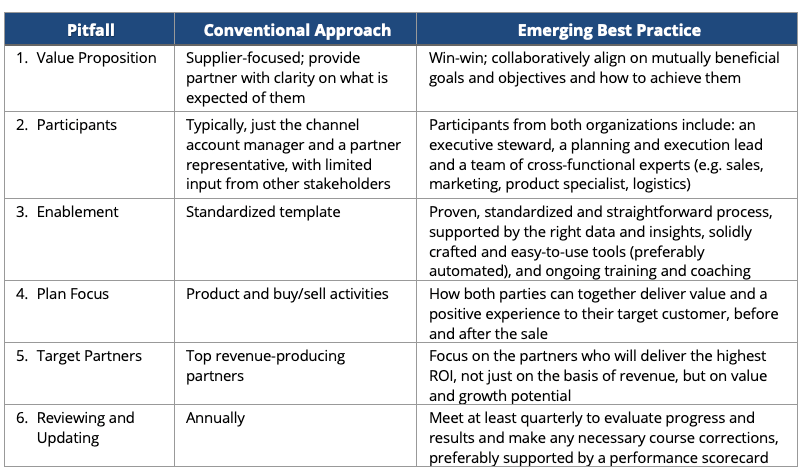Common Pitfalls of Joint Business Planning With Channel Partners and How to Avoid Them (Part Two)
- The first step on the path to joint business planning success is recognizing that it is not a highly recommended or obligatory annual task, but an ongoing partnership imperative to driving revenue
- Joint business planning with channel partners is one of the most effective means of driving alignment and more profitable revenue growth
- Joint business planning is a learned skill that must be supported by a proven, standardized process, the right data and insights, easy-to-use tools, and ongoing training and coaching
In the first post of this two-part series, I discussed the study we undertook to understand why joint business planning with channel partners often fails and the most effective ways to avoid these pitfalls. I also revealed the top three pitfalls that negatively impact this proven, revenue enhancing task — no value proposition for the partner; not having the right people committed, engaged and accountable; and lack of internal buy-in and enablement.
In this post, I cover an additional three core reasons why joint business planning breaks down, leading to failed outcomes.

One: Not Enough Focus on the Customer and Customer Experience
Given the reactive nature of most supplier-partner relationships and a rush to “just get it done,” joint business planning discussions usually focus on products and buying and selling activities, rather than mutual customers’ needs and how to jointly deliver value to them.
SiriusAction: Unless both parties invest the time to develop an understanding of the customer and the realities of the marketplace, they won’t come up with an action plan for growth. Therefore, joint business planning should begin with data and insight collection and analysis — first independently, then collaboratively, on the targeted customers. The intended outcome of this task is to walk into joint business planning armed with information such as who the customer is, why the customer buys, what and how the customer buys, as well as how the competition fits into the picture.
Two: Trying to Engage All Partners and/or the Wrong Partners
Joint business planning is an extremely effective tool for building stronger, more successful partnerships. However, it requires time, energy, resources and often investment by both parties. It is not an appropriate activity for all partnerships and should only be conducted with partners who will yield the highest ROI.
SiriusAction: The decision of which partners to plan with should not be based on revenue alone (bigger does not mean better). Assess and segment partners on the value they deliver (e.g. profitability, self-sufficiency) and their growth potential using a tool such as the SiriusDecisions Channel Partner Segmentation Matrix. Invest more joint business planning time and resources into companies that score high on all three criteria.
Three: Not Assessing Progress and Results Through Execution
With intense organizational pressure on short-term sales results, combined with many of the pitfalls mentioned previously, joint business plans often end up getting stored away until the next plan is due. This is as bad as not planning at all. If joint business planning is to be an effective tool, it must be used and reviewed continually. Even the best conceived plans require adjustments along the way.
SiriusAction: To keep these plans top-of-mind and execute them effectively, make it policy (not just best practice) for the full joint business planning team to meet at least quarterly to assess plan progress and results (i.e. QBRs). Once the plan is finalized, these sessions should be scheduled a year in advance to ensure that the time set aside for these sessions remains sacrosanct. To make these meetings productive, develop a standard agenda participants can follow consistently. A scorecard that has defined performance metrics to objectively measure plan progress is an essential tool to guide these discussions.
Conclusion
The six pitfalls shared in this blog series and summarized on the chart below are not meant to cover every potential joint business planning pitfall, but they are the most common fails reveals by our study. Through the experiences of our clients, we have validated that they can be resolved.
If you are interested in learning more about how SiriusDecisions has helped other channel sales organizations make joint business planning a revenue driver, as well as a differentiator and reputation builder for their business, contact us today.
